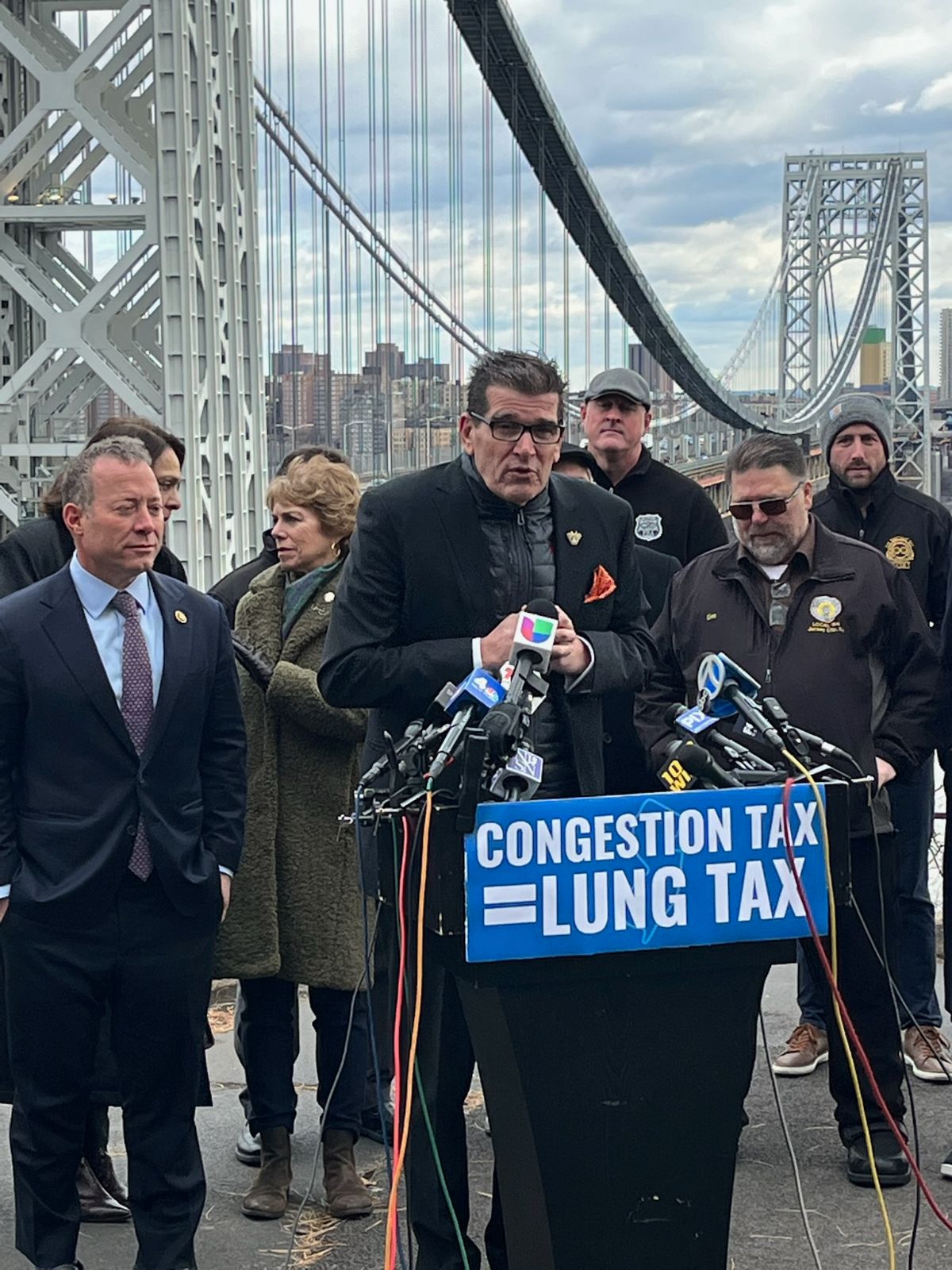
FORT LEE – Josh Gottheimer stood on a windy and cold overlook of the borough’s historic park and pointed down below to the George Washington Bridge.
On this Thursday after New Year’s Day, the morning traffic was light, but the CD-5 congressman was concerned about an overhead electronic sign on the bridge.
It said “new tolls” are coming Sunday.
Look, they’re already ready for congestion pricing was Gottheimer’s interpretation.
Actually, the sign had to do with new Port Authority bridge and tunnel tolls, but the overall point was the same. New Jersey residents continue to get squeezed by rising tolls and it’s time someone did something about it.
It’s not merely the cost.
“New York is charging us to increase pollution in our area,” he said.
Congestion pricing, which will charge drivers entering Manhattan below 60th street $9, is ready to start Sunday.
But Gottheimer and other New Jersey officials, who are strenuously fighting the idea, still have hope of stopping it.
Acting on a state suit, a federal judge on Monday presented a rather confusing ruling.
Judge Leo Gordon said the congestion pricing plan lacks specifics regarding the environmental impact on New Jersey and may warrant reconsideration. But the judge did not issue an injunction to stop the plan from beginning Sunday, Jan. 5.
The ruling was applauded – somewhat by both sides.
The New York side stressed that the judge did not stop the plan.
But on this side of the Hudson, Gottheimer and others noted that Gordon said the plan needs more specifics.
The discrepancy may be settled at a hearing before the judge Friday afternoon.
In the meantime, Gottheimer organized quite an impressive turnout of luminaries who are continuing to fight congestion pricing.
The Bergen County Commissioners were represented, as were local state Legislators. There were also reps from unions and the business community.
At times, the speakers didn’t talk loud enough to be heard over the traffic below, but everyone got the point.
Congestion pricing will hurt residents in the wallet but also make Fort Lee and nearby towns less healthy.
Here’s the argument.
Since congestion pricing kicks in at 60th Street, many drivers would likely use the GWB to reach Manhattan rather than the Holland or Lincoln tunnels. That would make bridge congestion worse than it is now.
Gottheimer is also unimpressed with why the city and the Metropolitan Transit Authority say they need to make driving in midtown more expensive.
That would be to make city streets less crowded and to financially help city buses and the subway.
Gottheimer scoffed at that, saying that if the MTA needs cash, it is because of its own “shocking mismanagement.” So, do not ask New Jersey drivers to bail you out, All eyes will be on Friday’s hearing.
One of today’s speakers, Fort Lee Mayor Mark Sokolich, said he thinks New Jersey’s argument that pollution and congestion will increase is a good one. We will see.
It may not mean anything, but Sokolich, the target of the infamous Bridgegate scheme back in 2013, knows something about congestion.
(Visited 30 times, 30 visits today)
New Jersey Congressman Josh Gottheimer has recently voiced his opposition to New York’s congestion pricing plan, which aims to reduce traffic congestion in Manhattan by charging drivers a fee to enter certain parts of the city during peak hours. Gottheimer argues that the plan unfairly targets New Jersey residents who commute into New York for work, placing an undue financial burden on them.
Congestion pricing has been implemented in cities around the world as a way to reduce traffic congestion, improve air quality, and generate revenue for transportation infrastructure projects. Under New York’s plan, drivers would be charged a fee to enter Manhattan below 60th Street, with the goal of reducing traffic and raising funds for the city’s struggling subway system.
However, Gottheimer believes that the plan will disproportionately impact New Jersey residents who rely on driving into the city for work. He argues that many New Jersey commuters do not have access to reliable public transportation options and that the congestion pricing fee would place an additional financial strain on them.
In response to Gottheimer’s concerns, New York officials have stated that they are open to discussing potential exemptions or discounts for New Jersey residents who regularly commute into the city. They have also emphasized the environmental and economic benefits of reducing traffic congestion in Manhattan.
The debate over New York’s congestion pricing plan highlights the complex challenges of managing transportation in a densely populated urban area. While congestion pricing has been successful in other cities, it is important to consider the potential impacts on commuters and work towards finding solutions that are equitable for all residents. As the discussion continues, it will be crucial for policymakers to engage with stakeholders from both New York and New Jersey to ensure that any congestion pricing plan is fair and effective.



